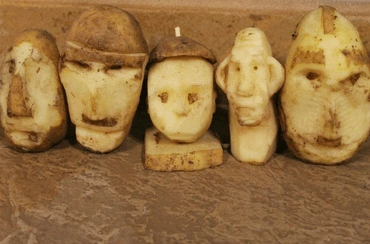1
Locutusque est Dominus ad Moysen, dicens :
2
Loquere ad filios Israël, et dices ad eos : Vir, sive mulier, cum fecerint votum ut sanctificentur, et se voluerint Domino consecrare :
3
a vino, et omni quod inebriare potest, abstinebunt. Acetum ex vino, et ex qualibet alia potione, et quidquid de uva exprimitur, non bibent : uvas recentes siccasque non comedent
4
cunctis diebus quibus ex voto Domino consecrantur : quidquid ex vinea esse potest, ab uva passa usque ad acinum non comedent.
5
Omni tempore separationis suæ novacula non transibit per caput ejus usque ad completum diem, quo Domino consecratur. Sanctus erit, crescente cæsarie capitis ejus.
6
Omni tempore consecrationis suæ, super mortuum non ingredietur,
7
nec super patris quidem et matris et fratris sororisque funere contaminabitur, quia consecratio Dei sui super caput ejus est.
8
Omnibus diebus separationis suæ sanctus erit Domino.
9
Sin autem mortuus fuerit subito quispiam coram eo, polluetur caput consecrationis ejus : quod radet illico in eadem die purgationis suæ, et rursum septima.
10
In octava autem die offeret duos turtures, vel duos pullos columbæ sacerdoti in introitu fœderis testimonii.
11
Faciet sacerdos unum pro peccato, et alterum in holocaustum, et deprecabitur pro eo, quia peccavit super mortuo : sanctificabitque caput ejus in die illo :
12
et consecrabit Domino dies separationis illius, offerens agnum anniculum pro peccato : ita tamen ut dies priores irriti fiant, quoniam polluta est sanctificatio ejus.
13
Ista est lex consecrationis. Cum dies, quos ex voto decreverat, complebuntur, adducet eum ad ostium tabernaculi fœderis,
14
et offeret oblationes ejus Domino, agnum anniculum immaculatum in holocaustum, et ovem anniculam immaculatam pro peccato, et arietem immaculatum, hostiam pacificam,
15
canistrum quoque panum azymorum qui conspersi sint oleo, et lagana absque fermento uncta oleo, ac libamina singulorum :
16
quæ offeret sacerdos coram Domino, et faciet tam pro peccato, quam in holocaustum.
17
Arietem vero immolabit hostiam pacificam Domino, offerens simul canistrum azymorum, et libamenta quæ ex more debentur.
18
Tunc radetur nazaræus ante ostium tabernaculi fœderis cæsarie consecrationis suæ : tolletque capillos ejus, et ponet super ignem, qui est suppositus sacrificio pacificorum :
19
et armum coctum arietis, tortamque absque fermento unam de canistro, et laganum azymum unum, et tradet in manus nazaræi, postquam rasum fuerit caput ejus.
20
Susceptaque rursum ab eo, elevabit in conspectu Domini : et sanctificata sacerdotis erunt, sicut pectusculum, quod separari jussum est, et femur. Post hæc, potest bibere nazaræus vinum.
21
Ista est lex nazaræi, cum voverit oblationem suam Domino tempore consecrationis suæ, exceptis his, quæ invenerit manus ejus : juxta quod mente devoverat, ita faciet ad perfectionem sanctificationis suæ.
22
Locutusque est Dominus ad Moysen, dicens :
23
Loquere Aaron et filiis ejus : Sic benedicetis filiis Israël, et dicetis eis :
24
Benedicat tibi Dominus, et custodiat te.
25
Ostendat Dominus faciem suam tibi, et misereatur tui.
26
Convertat Dominus vultum suum ad te, et det tibi pacem.
27
Invocabuntque nomen meum super filios Israël, et ego benedicam eis.







